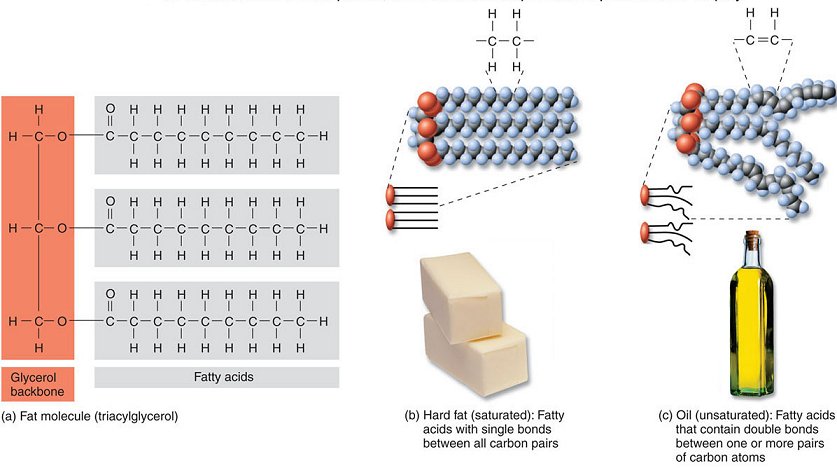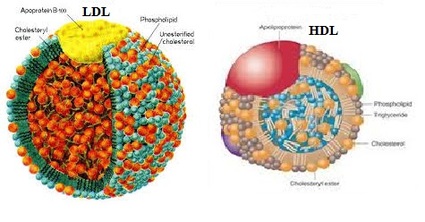Question #8249a
1 Answer
Eating a lot of saturated fat increases levels of "bad" LDL cholesterol in your blood, which can cause clogging up of blood vessels by plaque, leading to heart attacks and strokes.
Explanation:
Let's first talk about fat and the difference between Unsaturated Fat and Saturated Fat:
Chemically, a fat molecule is a Triglyceride (aka triacylglycerol): made up of 3 carboxylic acids with hydrocarbon chains of varying lengths ( fatty acid ** tails ) attached to a glycerol** head:
 )
)
Saturated fat: all of the carbons in the fatty acid tail are single bonded to hydrogens or each other.
Unsaturated fat: at least one of the carbons in the fatty acid tail is double-bonded to another carbon rather than hydrogen, i.e. the tail is "unsaturated" aka "not completely filled" by hydrogen. Within the unsaturated fat category, there's mono-unsaturated and poly-unsaturated fat:
- "Mono-unsaturated" fat: means there's 1 carbon double bond in the fatty acid tail. "Mono" = one.
- "Poly-unsaturated" fat: means there's >1 carbon double bond in the fatty acid tail. "Poly" = more than one.
With saturated fat, the hydrocarbon fatty acid tails are straight so they stack together very closely. As a result, dietary fat that have a high percentage of saturated fat are solid at room temperature and are known as " hard fats " like butter or animal fat.
With unsaturated fat, the carbon double bonds cause physical kinks in the tails which prevent them from stacking up nicely. Dietary fats that are mostly unsaturated are liquid at room temperature. They are oils like olive oil.
Here's a nice summary of fat (triglyceride):

Now let's talk about Cholesterol & Lipoproteins:
Cholesterol is an essential steroid molecule found in all cells (as a structural part of their cellular membranes) and used by the body as a building block to create steroid hormones, vitamin D, and other substances (i.e. bile) to help you digest food.
Plasma lipoproteins ("lipid" + "protein") particles are lipid-protein containers that carry cholesterol and fat in the bloodstream to where they need to go around the body:
 )
)
Cholesterol is mainly carried in the bloodstream by specific lipoprotein particles called LDL (low-density lipoproteins) and HDL (high-density lipoproteins):

LDL ("bad" cholesterol) vs HDL ("good" cholesterol):
When there's too much LDL (often called "bad" cholesterol in nutrition) in the blood, it tends to stick around and deposit its cholesterol to the walls of blood vessels, causing reactions that lead to a build-up of atherosclerotic plaque.
Plaque build-up in blood vessels decreases blood flow (and more importantly, oxygen-rich blood) to the parts of your body those vessels lead to. If the plaque ruptures (breaks open), it can cause a blood clot to form and quickly block blood flow to a vital organ like the heart or brain, depriving it of oxygen. This blockage of blood flow (or diminished flow) is what causes a heart attack, angina, a brain stroke, or other forms of cardiovascular disease.
HDL, on the other hand, pulls cholesterol away from the walls of blood vessels and carries it back to your liver to be excreted as bile. This is why HDL is often referred to as the "good" cholesterol and it is desirable to have a high percentage of HDL when your blood cholesterol levels are measured:
 )
)
Now back to Unsaturated vs Saturated Fat:
The total amount and balance of LDL vs HDL cholesterol in your blood is influenced by the amount and type of fat you eat in your diet.
There are strong positive relationships found between high dietary intake of Saturated Fat -> elevated LDL Cholesterol levels in blood -> elevated risk of Cardiovascular Disease.
Conversely, researchers find that swapping out saturated fats with mono- or poly-unsaturated fat in diet (i.e. using olive oil instead of butter) or just lowering your intake of saturated fat leads to reduced risk of cardiovascular disease.
TL;DR (too long; didn't read) version:
High saturated fat intake ->
High LDL cholesterol in blood ->
Higher risk of atherosclerotic plaque build-up ->
Higher risk of blocking blood vessels ->
Cardiovascular Disease: heart attack, stroke, peripheral artery disease, etc
A Bonus Section about "Trans Fat":
So remember how unsaturated fat have at least 1 double carbon bond, meaning they don't fit as many hydrogen atoms as a saturated fat does?
Well, at the turn of the 19th century, chemists figured out a way to add more hydrogen atoms to unsaturated fat in a process called "partial hydrogenation of oil".
While most naturally occurring unsaturated fat has double carbon bonds in a cis formation that give it a physical kink in the fatty acid tail, the partial hydrogenation process creates trans double bonds which are straight, not kinked (also where the name comes from):
![http://orlandoide.com/trans_fats/trans-fats2.html]()
Why do this? These "partially hydrogenated oils":
- don't spoil as much as normal oils
- can be reheated repeatedly
- by virtue of these trans double bonds not kinking, the oil is solid as opposed to liquid at room temperature making it easier to transport and use
- cheaper than usual solid fat from animals
Based on these great handling qualities, trans fat was used pervasively in cooking, i.e. in commercial baking, snack foods, margarine. ~95 percent of prepared cookies, 100 percent of crackers, and 80 percent of frozen breakfast products was estimated by the FDA to contain trans fat at one point (source).
Unfortunately, what was great for food makers is terrible for your body's LDL and HDL cholesterol balance. Even more harmful than saturated fat, trans fat has been found to simultaneously increase "bad" LDL levels AND decrease "good" HDL levels. Trans fat is a double-whammy in increasing your risk of plaque formation and cardiovascular disease. Trans fats have also been found to promote insulin resistance and obesity, leading to increased risk of diabetes.
Trans fat is also entirely a man-made problem. Although there is a small amount of naturally occurring trans fat in what we eat, the vast majority of trans fat is produced through this chemical process and eaten in food prepared in "vegetable shortening" or "partially hydrogenated vegetable oil".
Trans fat has been found to be so conclusively harmful to human health that the FDA now requires food makers to specifically list "trans fat" as an ingredient on food labels. Governments are passing laws to phase it out of all food. New York City is the largest city to go "trans free" in all food establishments.
The take-away: Look on your food labels. Don't eat anything with trans fat in it.

